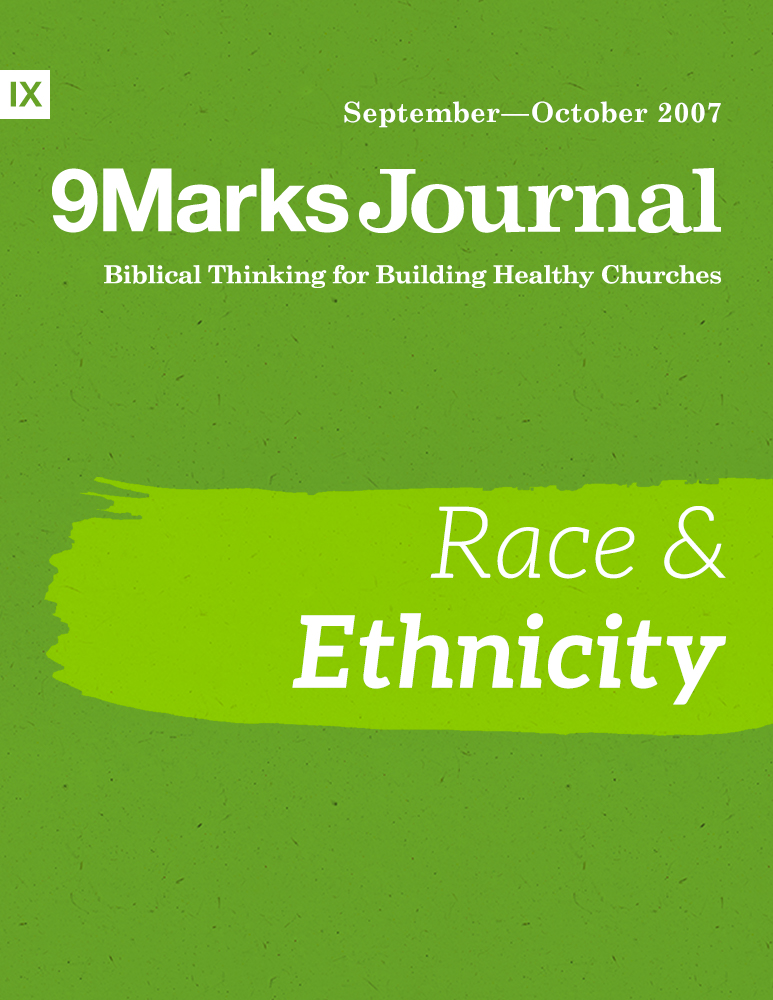
Race and Ethnicity
Is There a Race Problem?
Starting the Conversation with Earth, Wind, and Fire
with Thabiti Anyabwile and Jonathan Leeman
A Pastors and Theologians Forum
with Various Contributors
Nine Lessons I Learned from ‘Yellow’ (and One More)
by Sam Lam
Did Moses Marry a Black Woman?
by John Piper
Reflections on the Problem
Book Review: On Being Black and Reformed, by Anthony Carter
by Rickey Armstrong
Book Review: From Every People and Nation: A Biblical Theology of Race, by J. Daniel Hays
by Tony Carter
Book Review: Reconciliation Blues: A Black Evangelical’s Inside View of White Christianity, by Edward Gilbreath
by Eric C. Redmond
Book Review: Being Latino in Christ: Finding Wholeness in Your Ethnic Identity, by Orlando Crespo
by Juan Sanchez
Book Review: Growing Healthy Asian-American Churches, edited by Peter Cha, S. Steve Kang, and Helen Lee
by Jeremy Yong and Geoffrey Chang
Five Steps for Racial Reconciliation on Sunday at 11 a.m.
by D.A. Carson
Overcoming the Problem
Pastoring a Multi-Ethnic Church
by John Folmar
Many Ethnicities, One Race
by Thabiti Anyabwile
Editor’s Note:
Let me ask my fellow white readers a question: do you think of yourself as “white”? If not, may I suggest that you are racially insensitive?
Now a question for any African American readers: to what extent does “blackness” define the way you think of yourself? To whatever extent it does, may I suggest that your thinking is impeding reconciliation?
And a question for any Asian or Hispanic readers: to what extent does race shape your identity? If it doesn’t, is that because of acculturation, assimilation, or alienation?
I’m no Luke Skywalker, but in my thinking about ethnicity and race Thabiti Anyabwile is my Yoda. He’s pushed me in the directions conveyed by these three questions, which is why this issue of the 9Marks eJournal begins and ends with the sophisticated analysis of Master Anyabwile. The “Conversation Starts with Earth, Wind and Fire” in my email exchange with him. The conversation ends and turns in an exciting new direction in our saving-the-best-for-last piece, Anyabwile’s “Many Ethnicities, One Race.”
To summarize, Pastor Anyabwile argues that the Christian call for “racial reconciliation” is, ironically, self-defeating, because there is no such thing as different “races.” To continue even thinking as if there are different races requiring reconciliation is to keep people from being fully reconciled. (Is that deconstruction or what?!) True reconciliation begins when we recognize that we all belong to one race in Adam and, if we are Christians, to one new race—the people of God in Christ. What this means practically in the church, however, is being not less aware of different skin colors, but more!
In between these two contributions a number of brothers pour their hearts out. Let me encourage my fellow Whites to listen earnestly to the different voices in the “Are Whites Missing It?” forum. Do we have ears to hear? Some of the same questions about insensitivity and ignorance are raised in the excellent book reviews from Armstrong, Carter, Chang, Jones, Redmond, Sanchez, and Yong.
Also, Sam Lam observes the myth of “color blindness.” John Piper asks a provocative question with provocative ramifications. And the D. A. Carson reprint from his book Love in Hard Places offers a good primer for the entire conversation.
Here’s one more question for everyone: do you think the question of race is a big deal? It’s worth observing that one of the Bible books we most associate with the gospel of justification by faith—Galatians—finds its launching point in Paul’s opposition to a form of racism—Judiaizing. Some said you have to be Jewish to be saved. Wrong, Paul said. Racism or anything close to it is anti-gospel. John Folmar, the pastor of a church with over fifty nationalities in one of the hardest neighborhoods on the planet, shows us how the gospel alone has the power to demolish the worst strongholds.
On behalf of 9Marks, let me say how deeply grateful we are to each of the brothers who have talked about race in this issue of the 9Marks eJournal, each one of them doing so freely and lovingly. God be praised for the reconciliation we share and enjoy in Christ.
—Jonathan Leeman
Free Download
PDF, ePub, and Kindle files will be sent to this email address. As part of our community, you will receive content & communication from 9Marks. You may unsubscribe at any time.
